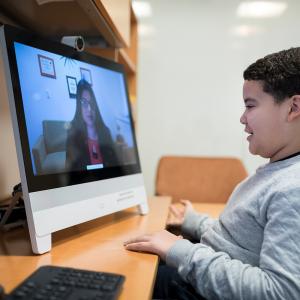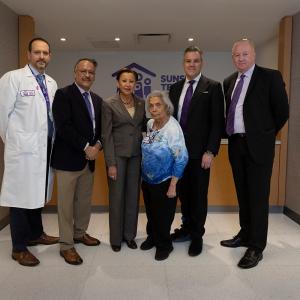Advanced Technology Makes High-Quality Care Readily Accessible to Underserved Communities

Photo: Karsten Moran
A young boy and his guardian sat comfortably in an office at the school-based health center at P.S. 24. With the aid of technology, he soon appeared on a video monitor miles away in the office of Yana Serobyan, MD, the same office where he had seen the psychiatrist on several previous visits. The two began to engage just as they had in the past.
Welcome to telepsychiatry: an interactive, video-based means of connecting patients to important mental health services. NYU Langone now makes this service available through its network of school-based health programs.
“Today’s youth face enormous physical, emotional, and mental health challenges,” says Larry K. McReynolds, executive director of the Family Health Centers at NYU Langone, senior vice president of community health, and clinical associate professor in the Department of Population Health. “The demand across the country for pediatric and adolescent behavioral health services far exceeds the number of professionals trained in child and adolescent psychiatry. Telepsychiatry is a clinically and cost-effective solution that also is easily accessible.”
Attention deficit hyperactivity disorder (ADHD), depression, anxiety and panic disorders, phobias, and post-traumatic stress are common mental health problems among children and teens. They are often exacerbated by difficult living conditions, according to W. Gordon Frankle, MD, chief of psychiatry at NYU Langone Hospital—Brooklyn.
“With approval from the New York State Office of Mental Health, we launched a pilot program in telepsychiatry in late March at two schools: P.S. 24 and Sunset Park High School,” Dr. Frankle says. “At the end of the school year, we will evaluate the program and plan next steps.”
McReynolds points out that telepsychiatry is greatly facilitated through Epic, NYU Langone’s sophisticated electronic medical record system, which is accessible at all NYU Langone facilities, including hospitals, doctors’ offices, clinics, and community- and school-based health centers. “Without Epic, school-based telepsychiatry would not be possible,” he adds.
How Telepsychiatry Works
Dr. Serobyan is one of four child and adolescent psychiatrists at the Sunset Terrace Family Health Center, where behavioral health and primary care services are provided and from where Dr. Serobyan and her colleagues conduct telepsychiatry sessions.
Before his “video visit,” the child was seen in the school-based health center and his vital signs, weight, and height were entered into Epic for Dr. Serobyan to review in her office.
Once the session began, the young boy’s face beamed as his guardian told the doctor that the new medication he was prescribed seemed to be working. His guardian reported a marked improvement in his behavior in class and at home. After reviewing his medication and overall health and discussing next steps, a follow-up video visit was scheduled.
“I could see that the boy looks happy and appears in better control,” noted Dr. Serobyan.
The telepsychiatry session is conducted the same way as a face-to-face visit. If needed, Dr. Serobyan can remotely adjust the video camera for a close-up or wide angle view of the room.
“Both the guardian and the patient were very pleased with the new way of seeing Dr. Serobyan,” says Gerardine Cadet Mareus, LCSW, manager for school-based behavioral health at the Family Health Centers at NYU Langone. “Previously, she would have had to leave work early, pick up the boy from school, and rush to the doctor’s office several blocks away. This new arrangement cuts down some of the stresses associated with coordinating busy schedules.”
Appointments with psychiatrists based at the Sunset Terrace Family Health Center are coordinated by the on-site social worker for about 60 elementary school patients who attend P.S. 24 and another 50 teens who are students at Sunset Park High School.
For more information about the Family Health Centers at NYU Langone, read the annual report.
Media Inquiries
Colin DeVries
Phone: 718-630-7414
colin.devries@nyumc.org

